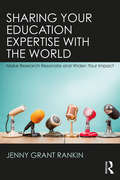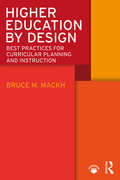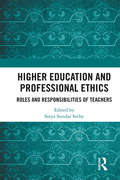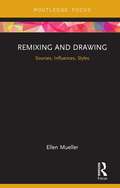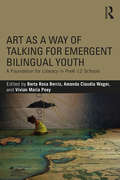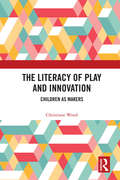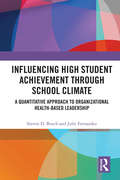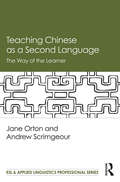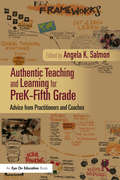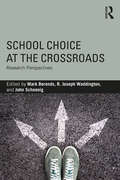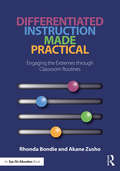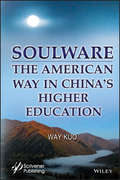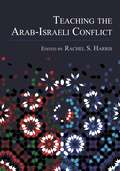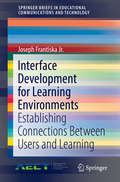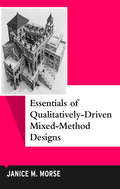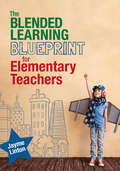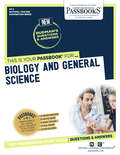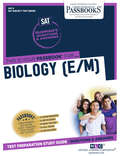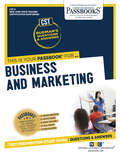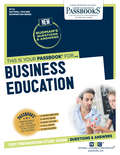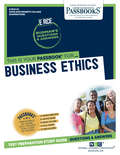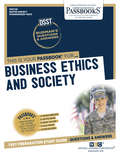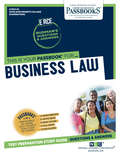- Table View
- List View
Clinical Experiences in Teacher Education: Critical, Project-Based Interventions in Diverse Classrooms (Routledge Research in Teacher Education)
by Kristien Zenkov Kristine PytashResponding to multiple scholarly, policy, and practical calls for a greater focus on clinical teacher preparation, this volume operates on the assumption that few experiences in future teachers’ training are more important than their field experiences. This text introduces the model of critical, project-based (CPB) clinical experiences, which provides teacher candidates with exemplary on-the-ground training, honors veteran teachers as school-based teacher educators, and offers university-based teacher educators new roles that ensure their practices and scholarship are explicitly relevant to all of schools’ constituents. Answering the call for relevant, high quality, clinically-based teacher education, this volume will offer scholarly and narrative examinations of examples of CPB clinical experiences that will be of interest to all involved in and impacted by educator preparation programs.
Sharing Your Education Expertise with the World: Make Research Resonate and Widen Your Impact
by Jenny Grant RankinThis highly practical guide helps education experts of all levels share their knowledge, work, and research beyond their own field and colleagues. By pursuing the recommendations in this book, educators and researchers can increase the exposure of their ideas and impact more students’ lives (this also enhances readers’ CVs and careers). Chapters cover the most effective and efficient ways to share readers’ expertise with the world, such as: Branding (crafting your pitch and leveraging social media) Writing (landing book deals and succeeding in key writing opportunities) Speaking (giving TED Talks, delivering conference keynote presentations, appearing on NPR, landing interviews, and contributing to public dialogue) Participating and serving (making connections, influencing policy, and joining panels or advisory boards) Honors (winning awards and recognition to expand your platform) Rich in tips, strategies, and guidelines, this book also includes downloadable eResources that provide links, leads, and templates to help secure radio broadcasts, podcasts, conferences, and other publication opportunities.
Higher Education by Design: Best Practices for Curricular Planning and Instruction
by Bruce M. MackhFaculty in higher education are disciplinary experts, but they seldom receive formal training in teaching. Higher Education by Design uses the principles of design thinking to bridge this gap through practical examples and step-by-step instructions based on educational theory and best practices in pedagogical and curricular development. This book offers practical advice for effective teaching and instruction, interdisciplinary curricular collaborations, writing course syllabi, creating course outcomes and objectives, planning assessments, and building curricular content. Whether you are a seasoned professor or new instructor, the strategies in this book can improve your practice as an educator.
Higher Education and Professional Ethics: Roles and Responsibilities of Teachers
by Satya Sundar SethyThis book discusses the significance, relevance, and usefulness of professional ethics in the context of higher education. It highlights the pivotal role of professional ethics in offering teachers a better understanding of their responsibilities, duties, rights, and institutional obligations as they work to provide quality education. The volume investigates the connection between the adoption of professional ethics by individual faculty members in higher education and the development of work cultures in higher educational institutions. It explores the requisite modifications of the Teachers’ Code of Ethics in relation to the usage of Information and Communication Technologies (ICTs) in teaching–learning platforms. While examining the validity, reliability, and application of professional ethics in the higher education sector, the book also illustrates the application of codes of ethics to resolve conflicting interests and commitments. This book will be useful to scholars and researchers in higher education, the philosophy of education, applied ethics, public policy, and the social sciences.
Remixing and Drawing: Sources, Influences, Styles
by Ellen MuellerThis succinct book articulates a clear framework for remixing in drawing at intermediate and advanced levels. It begins by walking through the ideas of copyright and fair use, providing context, examples, and advice. Mueller directs students through building a collection of sources and influences, leading to the development and analysis of style. With a full chapter on techniques, including approaches to brainstorming, critique, and reflection, this book features over 50 exercises that are easily adapted to various approaches, media, and technologies as necessary. Two sample syllabi are included for both a semester and a quarter system.
Art as a Way of Talking for Emergent Bilingual Youth: A Foundation for Literacy in PreK-12 Schools
by Berta Rosa Berriz Amanda Claudia Wager Vivian Maria PoeyThis book features effective artistic practices to improve literacy and language skills for emergent bilinguals in PreK-12 schools. Including insights from key voices from the field, this book highlights how artistic practices can increase proficiency in emergent language learners and students with limited access to academic English. Challenging current prescriptions for teaching English to language learners, the arts-integrated framework in this book is grounded in a sense of student and teacher agency and offers key pedagogical tools to build upon students’ sociocultural knowledge and improve language competence and confidence. Offering rich and diverse examples of using the arts as a way of talking, this volume invites teacher educators, teachers, artists, and researchers to reconsider how to fully engage students in their own learning and best use the resources within their own multilingual educational settings and communities.
The Literacy of Play and Innovation: Children as Makers
by Christiane WoodThe Literacy of Play and Innovation provides a portrait of what innovative education looks like from a literacy perspective. Through an in-depth case study of a "maker" school’s innovative design—in particular, of four early childhood educator’s classrooms—this book demonstrates that children’s inspiration, curiosity, and creativity is a direct result of the school environment. Presenting a unique, data-driven model of literacy, play, and innovation taking the maker movement beyond STEM education, this book helps readers understand literacy learning through making and the creative approaches embedded in early literacy classroom practices.
Influencing High Student Achievement through School Culture and Climate: A Quantitative Approach to Organizational Health-Based Leadership
by Steven Busch Julie FernandezThis book demonstrates how the school principal’s consideration of culture and climate of the school can significantly improve and sustain student achievement over time. Highlighting an innovative approach to organizational health and student achievement, this volume uses inferential statistical data analysis to quantify the way school leaders can strategically interact within school culture and systems to improve student achievement. A cutting-edge analysis of the importance of school climate, this book draws on current research from the Organizational Health Inventory diagnostic framework to provide data-based conceptual models of the relation between culture and leadership.
Teaching Chinese as a Second Language: The Way of the Learner (ESL & Applied Linguistics Professional Series)
by Jane Orton Andrew ScrimgeourGrounded in analysis of Chinese and international educational concepts and classroom techniques currently used to teach Chinese as a Second Language, and a thorough review of recent research in the field, this volume identifies the learning challenges of the language for native English speakers. Orton and Scrimgeour assess the gap in knowledge and skills between learners’ initial and future proficiency levels as L2 Chinese speakers, map their needs as learners towards achieving a high language proficiency, and set out an informed, integrated teaching orientation and practice for the Chinese classroom that responds to those needs. Chapters in the volume address curriculum design, teaching diverse learners and levels, the learning challenges of Chinese oral and literacy skills, grammar and vocabulary, discourse development, cultural understanding, and the affordances of a visit to China. Filled with original and engaging teaching and learning tools and techniques, this book is an essential and rich content resource for primary and secondary teachers, and teacher candidates and educators in Chinese as a Second Language education.
Authentic Teaching and Learning for PreK–Fifth Grade: Advice from Practitioners and Coaches
by Angela K. SalmonAuthentic Teaching and Learning for PreK–Fifth Grade provides examples of pedagogical approaches to enhance rich curriculums based around frameworks such as Teaching for Understanding, Making Thinking and Learning Visible, Artful Thinking, and Out of Eden Learn. You will learn about real classrooms that have successfully transformed cutting-edge ideas from these different frameworks into powerful learning experiences. A highly practical resource based on Harvard’s Project Zero ideas, this book shares how research findings have been complemented and implemented in the field, and will teach you how to apply best practices that lead to meaningful and authentic learning experiences in the classroom that promote Habits of Mind.
School Choice at the Crossroads: Research Perspectives
by Mark Berends R. Joseph Waddington John SchoenigSchool Choice at the Crossroads compiles exemplary, policy-relevant research on school choice options—voucher, private, charter, and traditional public schools—as they have been implemented across the nation. Renowned contributors highlight the latest rigorous research findings and implications on school vouchers, tuition tax credits, and charter schools in states and local areas at the forefront of school choice policy. Examining national and state-level perspectives, each chapter discusses the effects of choice and vouchers on student outcomes, the processes of choice, supportive conditions of school choice programs, comparative features of school choice, and future research. This timely volume addresses whether school choice works, under what conditions, and for whom—further informing educational research, policy, and practice.
Differentiated Instruction Made Practical: Engaging the Extremes through Classroom Routines
by Rhonda Bondie Akane ZushoNeed to decide when, why, and how to differentiate instruction in the classroom? Differentiated Instruction Made Practical introduces teachers to All Learners Learning Every Day (ALL-ED), an easy-to-use framework that enables tailored instruction for every learner. These unique, self-regulated learning routines were developed by an experienced K-12 teacher and researcher in collaboration with an educational psychology scholar. Filled with useful classroom examples, evaluation procedures, self-reflection activities, and relevant background information, this essential guide will help classroom teachers think on their feet and promote success for all students—not just the middle of the pack.
Soulware: The American Way in China's Higher Education
by Way KuoThis book is a critical account of the history, evolution and challenges of higher education in mainland China, Taiwan and Hong Kong, with important reflections on other systems, notably those in the US, UK, Korea and Japan. In addition to hardware and software, it introduces the concept of "software" in global higher education and analyses its importance for internationalization and the pursuit of excellence. In an age where robots and artificial intelligence are impacting our jobs and our daily lives, its critical analysis and insightful reflections provide considerable value for a range of global stakeholders interested in higher education reform to nurture talent and promote innovation to prepare students for an unpredictable future. "Professor Kuo's perspective provides considerable value for a range of global stakeholders both in the east and the west. As American universities awake to the realization that the demand for higher education is an increasingly global phenomena, his contribution could not be more timely."—Mike Crow, PhD President, Arizona State University "Way Kuo advances a powerful historical argument for the means to achieve excellence in Asian universities. His recipe is bold leadership, combining excellence in teaching and research, and embracing the lessons of western university successes and failures. A superb combination of history and forward thinking."—Michael Kotlikoff, VMD, PhD Provost, Cornell University "Way's book is not just about the past or the present. Rather, it offers useful insights into the future. In an age where robots and artificial intelligence are impacting our jobs and our daily lives, he introduces the concept of "soulware" and analyzes its importance for higher education."—G. P. "Bud" Peterson, PhD President, Georgia Institute of Technology "Wisdom is the ultimate goal of higher education. It is the illumination of that wisdom among audiences, English-speaking or Chinese-speaking, to which Way Kuo's book hopes to kindle a spark." —Frank H. Shu, PhD President, 2002-06, National Tsing Hua University, Taiwan University Professor, University of California System
Teaching the Arab-Israeli Conflict
by Rachel S. Harris Jacob Lassner Caitlin Carenen Janice W. Fernheimer Martin Shichtman Ashley Passmore Dr Donna R. Divine Adia Mendelson-Maoz Marcela Sulak Ellen W. Kaplan Beverly Bailis Ranen Omer-Sherman Marilyn R. Tayler Randall G. Rogan Cary Nelson Oren Kroll-Zeldin Russell A. Berman Alan Dowty Shayna Weiss Amy Weiss Olga Gershenson Holli Levitsky Terri Susan Fine Philip Metres Shiri Goren Umut Uzer P. R. Kumaraswamy Husam Mohamad Menna Abukhadra Peter C. Herman Rachel Feldhay Brenner Jeffrey Bloodworth Ari Ariel Mira Sucharov Mya Guarnieri Jaradat Susan Jacobowitz Rolin G. Mainuddin Liora R. Halperin Joel S. Migdal Randy DeshazoThe Arab-Israeli conflict has become a touchstone of international politics and a flash point on college campuses. And yet, how do faculty teach such a contentious topic in class? Taught not only in international relations, peace and conflict resolution, politics and history, and Israel and Middle Eastern studies courses but also in literature, sociology, urban planning, law, cinema, fine art, and business—the subject guarantees wide interest among students. Faculty are challenged to deal with the subject’s complexity and the sensitive dynamics it creates. The result is anxiety as they approach the task and a need for guidance. Teaching the Arab-Israeli Conflict edited by Rachel S. Harris is the first book designed to meet this need. Teaching the Arab-Israeli Conflict brings together thirty-nine essays from experienced educators who reflect on the challenges of engaging students in college classrooms. Divided into seven sections, these personal essays cover a broad range of institutional and geographical settings, as well as a wide number of academic disciplines. Some of the topics include using graphic novels and memoirs to wrestle with the complexities of Israel/Palestine, the perils of misreading in the creative writing classroom as border crossing, teaching competing narratives through film, using food to teach the Arab-Israeli conflict, and teaching the subject in the community college classroom. Each essay includes suggestions for class activities, resources, and approaches to effective teaching. Whether planning a new course or searching for new teaching ideas, this collection is an indispensable compendium for anyone teaching the Arab-Israeli conflict.
Interface Development for Learning Environments: Establishing Connections Between Users and Learning (SpringerBriefs in Educational Communications and Technology)
by Joseph Frantiska Jr.This brief will examine and explore some tools and techniques that can be used to develop interfaces for learning environments. Interface design has been a topic in software engineering for many years. The advent of graphical user interfaces has created many remedies and challenges for the software engineer. In recent years with an increased emphasis in educational technology, instructional designers are also included in this arena. The interface can be a driver in terms of a learning environment’s ability to engage a student. It can also provide a point of information exchange and therefore learning between the student and the environment’s software. Thus, the issue of an interface is vital to the success of a learning environment. This brief will produce a variety of interfaces for various environments to allow the designer to contrast and compare them based upon the required purpose. The designer will have a toolkit filled with tools and techniques which will allow for interfaces that will engage the student and facilitate their learning. The primary audiences are K-12 and post-secondary educators who desire to create digital media based educational materials.
Essentials of Qualitatively-Driven Mixed-Method Designs (Qualitative Essentials #14)
by Janice M. MorseIn a mixed-method tradition that privileges the quantitative, leading qualitative researcher Janice Morse breaks new ground by arguing the importance of research designs for which the primary component is qualitative, and contains either a quantitative or a qualitative supplemental strategy. Using a variety of examples and visual prompts, Morse convincingly demonstrates that such designs allow novice researchers to obtain answers more quickly and with more certainty. Her book provides clear and concise explanations making even complex research designs understandable to the beginning researcher; argues for the importance of primary qualitative designs due to their theoretical strength; stresses the importance of using goal-directed actions and analyses that do not violate the assumptions of either qualitative or quantitative inquiry.
The Blended Learning Blueprint for Elementary Teachers (Corwin Teaching Essentials)
by Jayme LintonDesigned to help K-5 teachers develop and carry out a plan for effective instruction in blended environments, this resource identifies key competencies and strategies for development, culminating in a personalized implementation plan. Readers will Take an in-depth look at the iNACOL Blended Learning Teacher Competency Framework. Develop a personalized blueprint for designing and facilitating blended learning in your classrooms. Tailor your plan when it comes to maximizing instructional time, personalizing learning, empowering students, pursuing professional learning, and more. Explore specific strategies and examples of blended learning in elementary classrooms, and reflect on your own plans.
The Blended Learning Blueprint for Elementary Teachers (Corwin Teaching Essentials)
by Jayme LintonDesigned to help K-5 teachers develop and carry out a plan for effective instruction in blended environments, this resource identifies key competencies and strategies for development, culminating in a personalized implementation plan. Readers will Take an in-depth look at the iNACOL Blended Learning Teacher Competency Framework. Develop a personalized blueprint for designing and facilitating blended learning in your classrooms. Tailor your plan when it comes to maximizing instructional time, personalizing learning, empowering students, pursuing professional learning, and more. Explore specific strategies and examples of blended learning in elementary classrooms, and reflect on your own plans.
BIOLOGY AND GENERAL SCIENCE: Passbooks Study Guide (National Teacher Examination Series (NTE))
by National Learning CorporationThe National Teacher/PRAXIS Examinations are designed to provide objective measurement of the knowledge, skills and abilities required of teachers. The Passbook® for the Biology and General Science exam provides hundreds of multiple-choice questions in the areas that will likely be covered on your upcoming certification exam, including but not limited to: basic principles of biology; anatomy and physiology; and other related areas.
BIOLOGY: Passbooks Study Guide (College Board SAT Subject Test Series #F No. 28)
by National Learning CorporationSAT Subject Tests, developed by the College Board, are required by many colleges and universities as part of their admission requirements. The SAT Biology (E/M) Passbook® prepares you for your test by allowing you to take practice exams modeled after the real SAT Subject Test. It provides hundreds of questions and answers similar to the ones you will find on your upcoming exam.
Business and Marketing: Passbooks Study Guide (New York State Teacher Certification Examination Series (NYSTCE))
by National Learning CorporationThe New York State Teacher Certification Exams (NYSTCE) are required for all candidates seeking licensure in the State. The NYSTCE series consists of many different tests assessing skills and abilities necessary for teachers. The Passbook® for the Content Specialty Test in Business and Marketing provides hundreds of multiple-choice questions in the areas that will likely be covered on your upcoming certification exam, including but not limited to: business management; marketing principles; accounting; consumer economics; entrepreneurship; and other related areas.
BUSINESS EDUCATION: Passbooks Study Guide (National Teacher Examination Series (NTE))
by National Learning CorporationThe National Teacher/PRAXIS Examinations are designed to provide objective measurement of the knowledge, skills and abilities required of teachers. The Passbook® for the Business Education exam provides hundreds of multiple-choice questions in the areas that will likely be covered on your upcoming certification test.
Business Ethics: Passbooks Study Guide (Excelsior/Regents College Examination Series)
by National Learning CorporationThe Excelsior/Regents College Examinations (E/RCE) offer you an opportunity to obtain recognition for college-level learning and consists of exams designed to demonstrate achievement and mastery of various college-level subjects, such as the Arts and Sciences, Business, Criminal Justice, Education, Health and Nursing. The E/RCE Business Ethics Passbook® prepares you by sharpening knowledge of the skills and concepts necessary to succeed on the upcoming exam and the college courses that follow. It provides a series of informational texts as well as hundreds of questions and answers in the areas that will likely be covered on your upcoming exam.
BUSINESS ETHICS AND SOCIETY: Passbooks Study Guide (DANTES Subject Standardized Tests (DSST))
by National Learning CorporationThe DSST Subject Standardized Tests are comprehensive college and graduate level examinations given by the Armed Forces, colleges and graduate schools. These exams enable students to earn college credit for what they have learned through self-study, on the job, or by other non-traditional means. The DSST Business Ethics & Society Passbook® prepares candidates for the DSST exam, which enables schools to award credit for knowledge acquired outside the normal classroom environment. It provides hundreds of questions and answers in the areas that will likely be covered on your upcoming exam, including but not limited to: moral philosophies; social responsibilities of a business; regulation; international business; corporations and stakeholders; and more.
Business Law: Passbooks Study Guide (Excelsior/Regents College Examination Series #F No. 5)
by National Learning CorporationThe Excelsior/Regents College Examinations (E/RCE) offer you an opportunity to obtain recognition for college-level learning and consists of exams designed to demonstrate achievement and mastery of various college-level subjects, such as the Arts and Sciences, Business, Criminal Justice, Education, Health and Nursing. The E/RCE Business Law Passbook® prepares you by sharpening knowledge of the skills and concepts necessary to succeed on the upcoming exam and the college courses that follow. It provides a series of informational texts as well as hundreds of questions and answers in the areas that will likely be covered on your upcoming exam.

